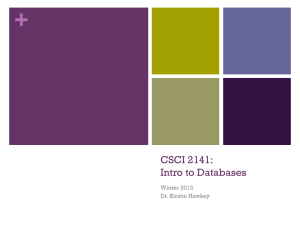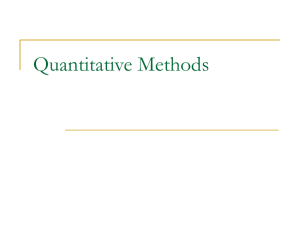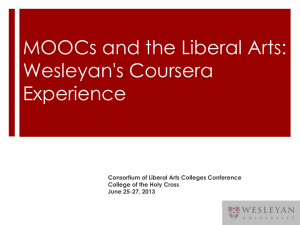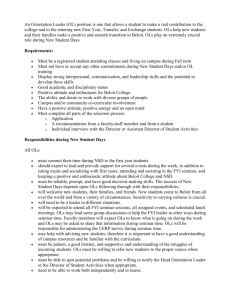Final Presentations
advertisement
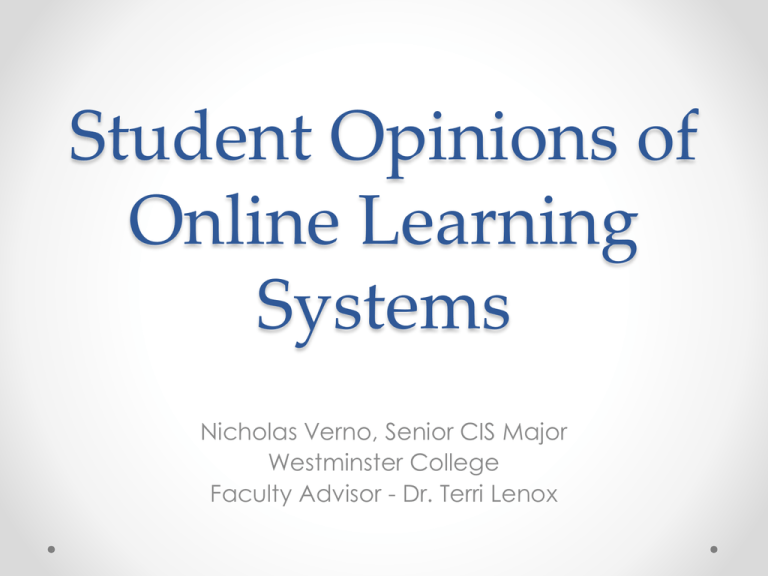
Student Opinions of Online Learning Systems Nicholas Verno, Senior CIS Major Westminster College Faculty Advisor - Dr. Terri Lenox Technology in Education • Technology is in every aspect of our lives • Personal, workplace, education • Educational involvement is growing rapidly o Computers/tablets in classrooms o Transition from paper to electronic o Online Learning Systems What is an Online Learning System? • Defined as any form of educational material which is readily available for distribution over the Internet o The intended audience can access the materials easily • Online Learning Systems, abbreviated OLS, can take the place of an instructor or be used as a tool to aid an instructor’s lectures Types of Online Learning Systems • Fully-online OLS – no instructor present, course is completed in its entirety online o Synchronous – alongside other students, deadlines are present o Asynchronous – without other students, no deadlines present • Partially-online OLS (Hybrid) – course is taken in online segments and face-to-face segments Examples of OLS • Coursera (fully online/asynchronous) Examples of OLS • Pearson MyLab (part of hybrid) What is the Point? • OLS are designed to make the material more accessible • With their ease of use and accessibility, OLS should revolutionize education for the better • Do they make learning easier and more effective? Previous Studies • 2013 Study by RELATE Education Group • Traditional Physics class vs. Physics MOOC o MOOC – Massive Open Online Course • Concluded that cannot statistically show MOOC or traditional is better • Course evaluations at the end determined it was strictly opinion based Other Studies • US Department of Education – 2010 o No statistical evidence • University of Toledo – 2007 o No statistical evidence • University of California Davis – 2003 o No statistical evidence • University of British Columbia 1995-2004 o No statistical evidence Helpful Insights Into Online Learning • Format of the OLS can impact learning o Association of Institutional Research in Toronto, 2002 • Features of OLS (i.e. extra practice, solution help, quizzes) can affect the opinions and attitudes towards online learning Applying Principles To My Project • 8 students engage in using Coursera OLS o “Learning How To Learn” • Pre/Post-test design process: o Determine question types o Scaled questions at first, switched to open ended • More personal responses o Generate questions to receive desired feedback • Analyze pre/post tests “Learning How To Learn” • Asynchronous fully online course taught by Neurobiology and Engineering professors – University of California – San Diego • Covers techniques about how to learn across various subjects o Math, science, sports, literature, arts, etc. • Different learning modes of the brain • Studying practices (memorization, avoiding procrastination) • 4 hours of video, 3 hours of exercises, 3 hours of bonus materials Questions to Answer • Did the use of Coursera alter their opinions about the willingness to use OLS in general? • After working with Coursera, would the students recommend it to others? • How does the impact of having prior experience with OLS change the students’ opinions of Coursera? Pre-test Statistics o 5 of 8 students initially preferred traditional o 62.5% Online vs. Traditional o 7 of 8 students would take a fully online course o 87.5% Fully Online Course Participation Online Traditional Would Take Would not Take Pre-test Statistics • Major Problem o 4 of 8 students claimed lack of teacher interaction (50%) o 2 of 8 students with said format of answers (25%)* o 2 of 8 students responded understanding was not required to get the correct answer (25%)* Major Problem With Coursera No Interaction Answer Format Lack of Understanding * - with prior experience Pre-test Statistics • Major Benefit o 5 of 8 students said working at their own pace (62.5%) o 3 of 8 students said having review/extra practice (37.5%) Major Benefit of Coursera Own Pace Practice/Review Post-test Statistics • Online vs. Traditional o 6 of 8 students preferred traditional over online(75%) o 2 of 8 students preferred online to traditional (25%) Online vs Traditional Online Traditional Post-test Statistics • Recommendations o 5 of 8 students would not recommend taking (62.5%) o 3 of 8 students would recommend taking (37.5%) Recommendation For Others Would Would not Conclusions • What does all of this data tell us? o Cannot statistically show that one method is better o Using Coursera changed the opinions of some who initially thought online was better o Coursera had a negative effect on some of the participants’ learning process o Some participants said using Coursera was better than previous experiences with OLS Conclusions • This small study leaves other questions to be answered in the future: o Does a student’s personality affect the opinion of OLS? o Would varying learning styles steer the opinions of students in a certain direction? o If the students weren’t already enrolled in classes at a traditional university, would their opinions change?
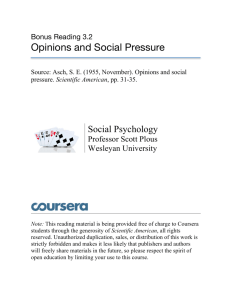
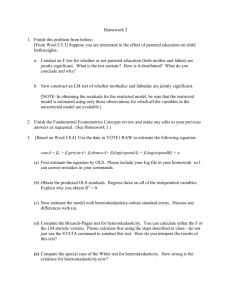
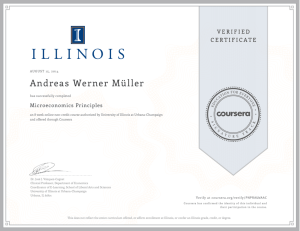

![Job Evaluation [Opens in New Window]](http://s2.studylib.net/store/data/009982944_1-4058a11a055fef377b4f45492644a05d-300x300.png)
